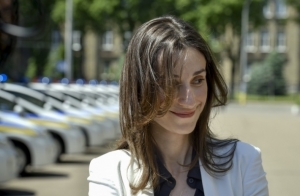Georgian-born Zguladze Out as Ukrainian Government Purges Reformists
KYIV – In a move widely seen as a major blow to Ukraine’s reform movement, the country’s Georgian-born First Deputy Interior Minister Ekaterina Zguladze tendered her resignation to the country’s cabinet of ministers late Wednesday evening.
Zguladze, a fiery 37-year-old reformer known by her diminutive “Eka”, previously served in the administration of former Georgian President Mikheil Saakashvili. She has been instrumental in overhauling Ukraine’s notoriously corrupt police force since being appointed to her position in December 2014.
Zguladze did release a formal statement regarding her resignation. Her former boss, Internal Affairs Minister Arsen Avakov, later confirmed that she intended to step down in a Tweet late Wednesday.
"Eka is stepping down as the first Deputy Minister. The government has satisfied her request. Sincerely: Big thanks for your job," Avakov posted on his Twitter account.
Avakov later said Zguladze would officially announce her resignation as well as her decision to remain in Ukraine as a member of a group of advisors.
"She (Zguladze) has accepted my proposition to resign. She will continue to help reform the Ministry of Internal Affairs,"said Avakov.
Zguladze first joined the Ukrainian government as one of dozens of foreign – mostly Georgian – pro-Western, reformist politicians who were given key positions in the post-Maidan Revolution Petro Poroshenko government. The group was tasked with fundamentally overhauling Ukraine’s political culture and steering the nation of 50 million out of Russia’s orbit and towards Euro-Atlantic integration.
Ukraine’s corrupt, and often criminal, Soviet-style police force was seen as a major obstacle towards implementing fundamental reforms. As she had previously done in Georgia during her six-year term as First Deputy Internal Affairs Minister, Zguladze carried out a comprehensive overhaul of Ukraine’s traffic police that gained praise both in the country and in the West. She also helped rebuild Ukraine’s civic police and introduced new Western-trained patrol units – many of which included Ukrainian women for the first time – that quickly earned the trust of the local population.
Old Guard Pushes Back
Rumors of Zguladze’s demise have circulated throughout Kyiv in recent weeks as top reformers in the government have been forced to resign or removed from their posts.
Many analysts believe the moves are part of a larger power struggle between the Western-oriented reformists that came to prominence immediately after the 2013-14 Maidan Revolution overthrew disgraced former pro-Russian President Viktor Yanukovych and powerful oligarchs who have long-standing ties to corrupt old guard politicians and warm relations with the Kremlin.
Ukraine’s deeply entrenched oligarch class – led by Donetsk-based, pro-Russian billionaire Rinat Akhmetov – has in recent months forcefully pushed back against any attempt to overhaul the country’s corrupt post-Soviet political and economic structure.
Reformists Out Amid Government Disarray
As the post-Maidan governing coalition fell into disarray in the late winter and early spring, leading reformers that included the widely lauded US-born former Finance Minister Natalie Jaresko, ex-Economic and Trade Minister Aivaras Aboromavicius of Lithuania, Georgian-born former Deputy Prosecutor General David Sakvarelidze and his Ukrainian colleague Vitaly Kasko were all dismissed or forced from their posts and later replaced with individuals tied to Yanukovych.
Zguladze’s resignation came only a day after Odessa’s reformist Deputy Governors, Maria Gaidar and Sasha Borovik – both of whom are closely aligned with Georgia’s former president-turned Odessa Regional Governor Saakashvili – were forced from office.
Officials in the Poroshenko government have justified the moves by citing a new law on barring dual citizenship for members of the government. Critics, however, have said the decision to enforce the law was aimed at purging foreign-born pro-Western reformers from Ukraine’s political establishment.
Zgualdze’s recent attempts to deepen the reforms within the Interior Ministry has put her at loggerheads with Avakov and his associates, most of whom are backed by powerful oligarchs and Poroshenko, himself.
Mounting accusations from the reform movement have grown louder in recent weeks as Zguladze and another Georgian national, Ukraine’s National Police Chief Khatia Dekanoidze, have seen their efforts to revamp the country's law enforcement bodies blocked by the courts and the country’s Prosecutor General’s office.
Police officers and law enforcement members previously sacked or lustrated for their ties to the Yanukovych regime have systematically been reinstated by the courts or independent appeals boards that are dominated by Yanukovych-era officials.
Their reinstatement has led to increased pressure on the government’s reformers, many of whom are overruled or contradicted by more powerful elements in the judicial system and upper echelons of the interior ministry.
The former head of the national police’s security department, Georgian-born Grigory Grigalashvili, was forced to resign and replaced by Avakov with Yevgeny Koval, a man tied to Yanukovych’s feared Berkut riot police, who has been accused of widespread corruption and cracking down on protestors during the Maidan Revolution.
In the aftermath of Zguladze’s resignation, speculation has now turned to how long her close ally Dekanoidze will remain in her post. According to Ukrainian weekly the Kyiv Post, Dekanoidze’s attempts to implement comprehensive reforms have been sabotaged by loyalists closely linked with Avakov.
News site Ukrainska Pravda reported on Wednesday, citing an anonymous source, that Dekanoidze could also be fired or demoted to the position of advisor by the end of the week.
In a separate development on Wednesday, another reformer closely associated with Saakashvili, Yulia Marushevska – who gained fame as the Maidan Revolution’s poster girl and who now serves as Odessa’s customs chief – was abruptly reprimanded by Ukraine’s State Fiscal Service.
Roman Nasirov, the service’s director, recommended that Marushevska should be immediately removed from her position for negligence and lack of formal experience for the job.
Nasirov was acting on the orders of Ukraine’s new Prime Minister and close Poroshenko ally Volodymyr Groysman, who ordered a comprehensive audit of all staff decisions made at the country’s customs offices.
Both Saakashvili and Marushevska spoke out against the review, claiming it was aimed at halting ongoing reforms at Odessa’s port and further curtailing Saakashvili’s waning influence over national policy.
By Nicholas Waller












